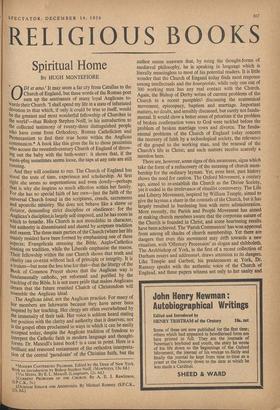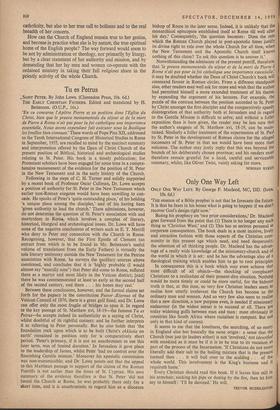RELIGIOUS BOOKS
Spiritual Home
BY HUGH MONTEFIORE 0 DI et amo.' It may seem a far cry from Catullus to the Church of England, but these words of the Roman poet sum up the sentiments of many loyal Anglicans to- wards their Church. 'I shall spend my life in a state of infuriated devotion to that which, if only it could be true to itself, would be the greatest and most wonderful fellowship of Churches in the world'âthus Bishop Stephen Neill, in his introduction to the collected testimony of twenty-three distinguished people who have come from Orthodoxy, Roman Catholicism and Protestantism to find their true home within the, Anglican communion.* A book like this gives the lie to those pessimists who accuse the twentieth-century Church of England of throw- ing out the baby with the bath-water: it shows that, if the waste-plug sometimes seems loose, the taps at any rate are still running.
And they will continue to run. The Church of England has stood the tests of time, experience and scholarship. At first sight she seems so unpretentious and even dowdyâperhaps that is why she inspires so much affection within her family. For she has no special faith of her ownâjust the faith of the universal Church found in the scriptures, creeds, sacraments and apostolic ministry. She does not behave like a shrew or dictator, demanding strict discipline or obedience: for the Anglican's discipline,is largely self-imposed, and he has room in which to breathe. His Church is not monolithic in character, but authority is disseminated and shared by scripture tradition and reason. The three main parties of the Church (where her life mainly resides) have been formed by emphasising one of these aspects; Evangelicals stressing the Bible, Anglo-Catholics leaning on tradition, while the Liberals emphasise the reason. Their fellowship within the one Church shows that truth and charity can co-exist without lack of principle or integrity. It is a truismâbut none the less true for thatâthat the liturgy of the Book of Common Prayer shows that the Anglican way is fundamentally catholic, yet reformed and purified by the teaching of the Bible. It is not mere pride that makes Anglicans dream that the future reunited Church of Christendom will resemble the Anglican ideal. The Anglican ideal, not the Anglican practice. For many of her members are lukewarm because they have never been inspired by her teaching. Her clergy are often overwhelmed by the immensity of their task. Her voice is seldom heard stating her position with the clarity and authority that it deserves; nor is the gospel often proclaimed in ways in which it can be easily accepted today, despite the Anglican tradition of freedom to interpret the Catholic faith in modem language and thought- forms. Dr. Mascall's latest bookt is a case in point. Here is a brilliant and reasoned restatement of the orthodox interpreta- tion of the central 'paradoxes' of the Christian faith, but the *MODERN CANTERBURY PILGRIMS. Edited by the Dean of New York. With an introduction by Bishop Stephen Neill. (Mowbrays, 13s. 6d.) Win MEDIA. By E. L. Mascall. (Longmans, 12s. 6d.) :CURRENT PROBLEMS OF THE CHURCH. By A. E. J. Rawlinson.
(S.P.C.K., 5s.)
DURHAM ESSAYS AND ADDRESSES. By Michael Ramsey. (S.P.C.K., 12.s. 6d) author seems unaware that, by using the thought-forms of mediaeval philosophy, he is speaking in language which is literally meaningless to most of his potential readers. It is little wonder that the Church of Engand today finds most response among intellectuals and the bourgeoisie, while only one out of 300 working men has any real contact with the Church. Again, the Bishop of Derby writes of current problems of the Church in a recent pamphlets discussing the ecumenical movement, episcopacy, baptism and marriage. Important matters, no doubt, and sensibly discussed, but surely not funda- mental. It would show a better sense of priorities if the problem of broken confirmation vows to God were tackled before the problem of broken marriage vows and divorce. The funda- mental problems of the Church of England today concern the recovery of faith by a technological society, the relevance of the gospel to the working man, and the renewal of the Church's life in Christ; and such matters receive scarcely a mention here.
There are, however, some signs of this awareness, signs which take the form of a rediscovery of the meaning of church mem- bership for the ordinary layman. Yet, even here, past history shows the need for caution. The Oxford Movement, a century ago, aimed to re-establish the Church as the Divine Society, yet it ended in the irrelevance of ritualist controversy. The Life and Liberty Movement, inspired by William Temple, aimed to give the layman a share in the counsels of the Church, but it has largely resulted in burdening him with mere administration. More recently, the Parish and People Movement has aimed at making church members aware that the corporate nature of the Church is founded in Christ, and some heartening results have been achieved. The 'Parish Communion' has won approval from among all shades of church membership. Yet there are dangers that even this movement may drift towards a new ritualism, with 'Offertory Procession' as slogan and shibboleth. The Archbishop of York, in the first of a recent collection of Durham essays and addressesti, draws attention to its dangers. Like Temple and Garbett, his predecessors at York, Dr. Ramsey speaks with the authentic voice of the Church of England, and these papers witness not only to her sanity and catholicity, but also to her true call to holiness and to the real breadth of her concern.
How can the Church of England remain true to her genius, and become in practice what she is by nature, the true spiritual home of the English people? The way forward would seem to be not by administration or theology, nor primarily by liturgy, but by a clear statement of her authority and mission, and by demanding that her lay men and women co-operate with the ordained ministry in taking their full religious share in the priestly activity of the whole Church.











































 Previous page
Previous page